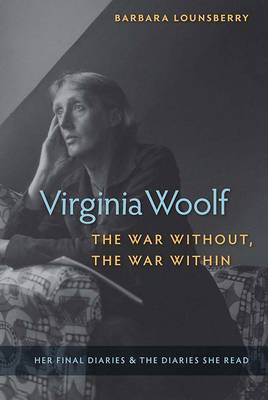
- Afhalen na 1 uur in een winkel met voorraad
- Gratis thuislevering in België vanaf € 30
- Ruim aanbod met 7 miljoen producten
- Afhalen na 1 uur in een winkel met voorraad
- Gratis thuislevering in België vanaf € 30
- Ruim aanbod met 7 miljoen producten
Zoeken
Virginia Woolf, the War Without, the War Within
Her Final Diaries and the Diaries She Read
Barbara Lounsberry
Paperback | Engels
€ 38,45
+ 76 punten
Uitvoering
Omschrijving
Choice Outstanding Academic Title In her third and final volume on Virginia Woolf's diaries, Barbara Lounsberry reveals new insights about the courageous last years of the modernist writer's life, from 1929 until Woolf's suicide in 1941. Woolf turned more to her diary--and to the diaries of others--for support in these years as she engaged in inner artistic wars, including the struggle with her most difficult work, The Waves, and as the threat of fascism in the world outside culminated in World War II. During this period, the war began to bleed into Woolf's diary entries. Woolf writes about Hitler, Mussolini, and Stalin; copies down the headlines of the day; and captures how war changed her daily life. Alongside Woolf's own entries, Lounsberry explores the diaries of 18 other writers as Woolf read them, including the diaries of Leo Tolstoy, Dorothy Wordsworth, Guy de Maupassant, Alice James, and André Gide. Lounsberry shows how reading diaries was both respite from Woolf's public writing and also an inspiration for it. Tellingly, shortly before her suicide Woolf had stopped reading them completely. The outer war and Woolf's inner life collide in this dramatic conclusion to the trilogy that resoundingly demonstrates why Virginia Woolf has been called "the Shakespeare of the diary." Lounsberry's masterful study is essential reading for a complete understanding of this extraordinary writer and thinker and the development of modernist literature.
Specificaties
Betrokkenen
- Auteur(s):
- Uitgeverij:
Inhoud
- Aantal bladzijden:
- 408
- Taal:
- Engels
Eigenschappen
- Productcode (EAN):
- 9780813068077
- Verschijningsdatum:
- 18/02/2020
- Uitvoering:
- Paperback
- Formaat:
- Trade paperback (VS)
- Afmetingen:
- 152 mm x 229 mm
- Gewicht:
- 598 g

Alleen bij Standaard Boekhandel
+ 76 punten op je klantenkaart van Standaard Boekhandel
Beoordelingen
We publiceren alleen reviews die voldoen aan de voorwaarden voor reviews. Bekijk onze voorwaarden voor reviews.







